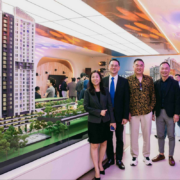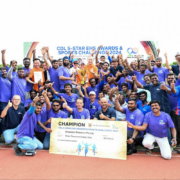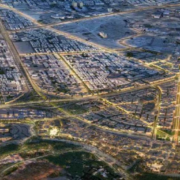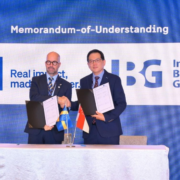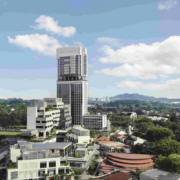Trinity Sensoria Sets a New Standard in Wellness and Safety for Urban Living

Trinity Group launched its latest residential development, Trinity Sensoria, which introduces an innovative five-tier protection system to provide residents unparalleled peace of mind. The project is a joint venture with Singapore-based property developer Oxley Holdings Ltd.
With a gross development value (GDV) of RM568 million, this 29-storey development is built on a 6.1-acre freehold plot and features 737 residential units ranging from 1,008 square feet to 2,591 square feet. Strategically located in Beverly Heights, Ampang North, the development is a 10km drive from the Kuala Lumpur city centre and easily accessible via highways such as the Middle Ring Road 2, Ampang-Kuala Lumpur Elevated Highway and Duta-Ulu Kelang Expressway. The connectivity would allow one to travel to Setapak, Wangsa Maju, Melawati, Pandan Indah, Setiawangsa and Titiwangsa. Various amenities nearby include Giant Supermarket, Melawati Mall, Wangsa Walk Mall, KL East Mall, Fairview International School, Brighton International School and Tunku Abdul Rahman University College. The Sri Rampai LRT station is the closest transport hub within a 5km radius.
5 Tiers of Protection for Safety and Wellness
Trinity Sensoria builds on the success of Trinity Wellnessa, the neighbouring project with a RM315 million GDV which pioneered the triple protection system. Officially launched in 2021, Wellnessa already has a 99 percent uptake.
Dato’ Neoh Soo Keat, Founder and Managing Director of Trinity Group Sdn Bhd said at the event, “Based on our success with Trinity Wellnessa, we understand that Malaysians now have a better awareness of wellness beyond just the physical aspect. They also appreciate the importance of mental and social wellbeing. Hence, we are thrilled to introduce Trinity Sensoria and its USP, the Five-Tier Protection System which is the first of its kind in Malaysia.”
Sensoria’s Five-Tier Protection System is designed with an integrated approach to residents’ safety and well-being by incorporating: contactless technology, wellness-oriented design, physical wellness facilities, social wellness spaces and mental wellness amenities. The name “Sensoria” was selected as it captures the essence of a new-age development that invigorates the five senses with holistic wellness experience for its residents.
“Modern homebuyers are seeking more than just a place to stay – they seek a sanctuary that actively supports their well-being. Sensoria provides a peaceful retreat, surrounded by greenery and enhanced by advanced safety and wellness features, so residents can truly ‘Live Well, Live Secure’,” Dato’ Neoh added.
Sensoria aims to stimulate residents’ senses through carefully curated amenities that align with contemporary urban living expectations. The development targets a diverse demographic, including middle-upper class families, professionals, investors, empty nesters, and first-time homebuyers. With prices starting from RM608,000 for the 1,008 square feet units,
Trinity Sensoria offers unparalleled value in the current market with a plethora of facilities, including an infinity pool, pickleball courts, mini-futsal court, edible garden, outdoor cinema, Himalayan salt sauna and hydrotherapy pods, offering a peaceful environment amidst the lush greenery. It also has a gym, multi-purpose hall, spa villa and many other exciting facilities.
Gold Assurance Programme for Sensoria
Trinity Sensoria is among the first developments to benefit from the Gold Assurance Programme, an initiative by Trinity Group designed to enhance homeowner security and confidence. The programme introduces key features that surpass industry norms, offering substantial benefits to homebuyers and investors, all subject to specific terms and conditions:
- 36-Month Defects Liability Period (DLP): Extending beyond the industry standard of 24 months, this longer period ensures that any defects or other faults due to the defective workmanship or material within the parcel are thoroughly addressed, offering buyers peace of mind and reducing potential repair costs.
- 10-Year Warranty for Roof Leaks: Surpassing the typical 2-year coverage, this warranty protects buyers from costly repairs and potential water damage, which can significantly impact property value.
- 5-Year Warranty for Tiles Pop-Up: Going beyond the standard 2-year warranty, this feature ensures that issues like tile popping are addressed, maintaining the property’s appeal and functionality.


